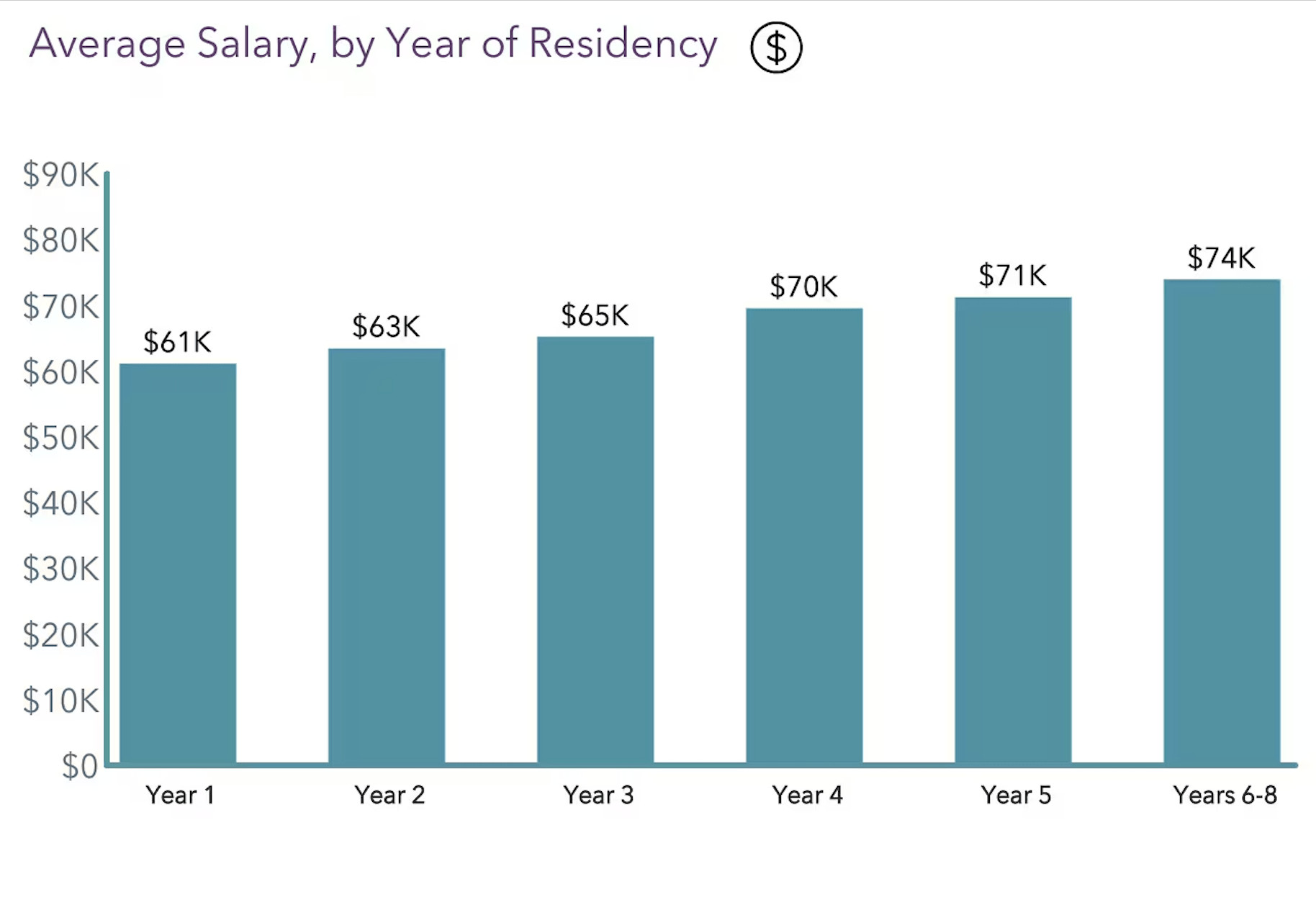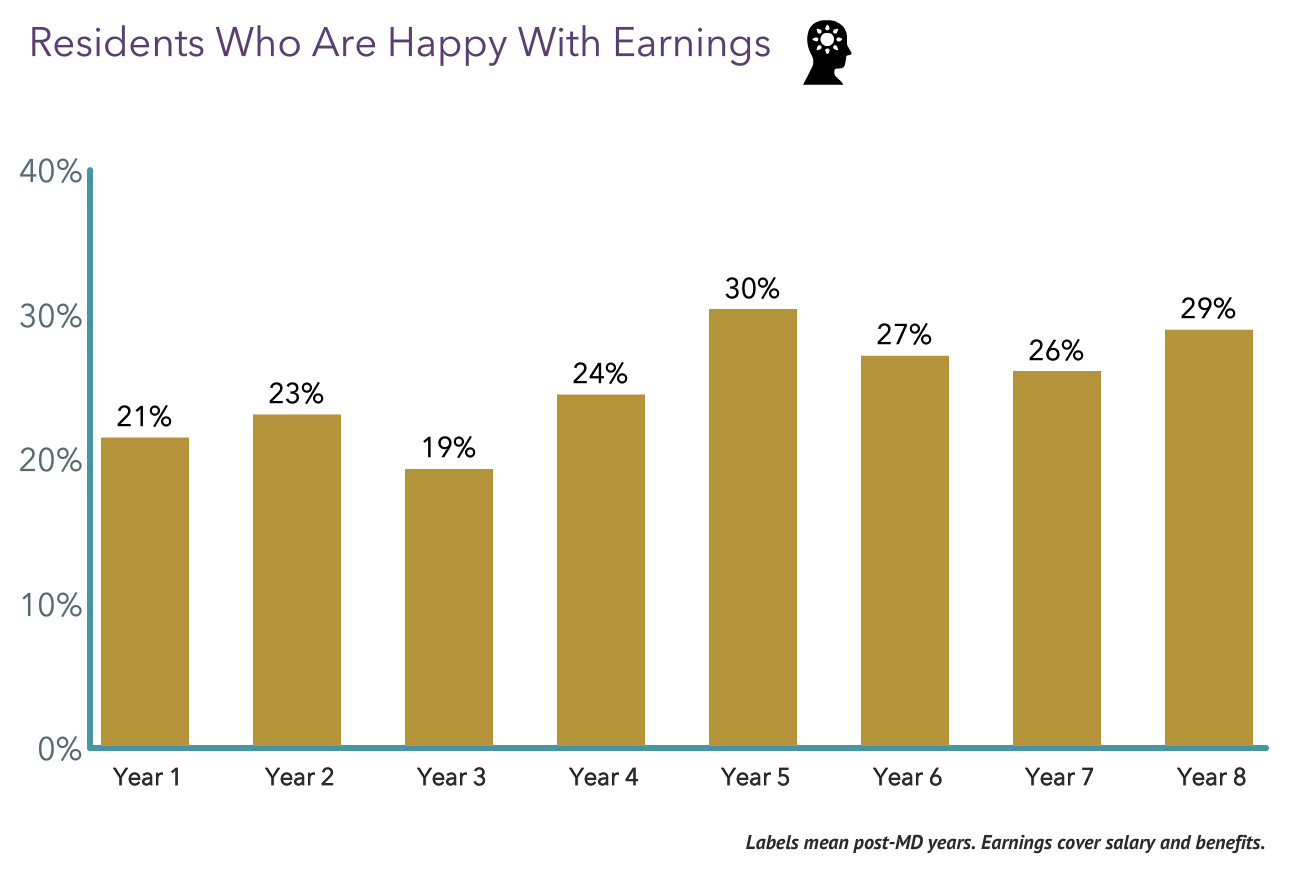Are Resident Doctors Paid? Yes, resident doctors in the US receive a salary during their residency, but the compensation may not reflect the demanding hours and responsibilities. At thebootdoctor.net, we understand the financial challenges faced by medical professionals, and it’s important to consider the compensation provided to these dedicated individuals. Learn more about resident salaries, work hours, and satisfaction, and discover the value they bring to healthcare through financial guidance, medical education, and physician compensation.
1. Do Resident Doctors Get Paid During Residency?
Yes, resident doctors in the United States are paid during their residency. However, considering the extensive hours they work, their compensation might not seem very high. While most residents receive similar pay, certain specialties offer higher or lower salaries based on the hours they’re expected to work. It’s essential to understand how resident salaries work to effectively manage personal finances and plan for the future.
 Resident doctor looking at a tablet
Resident doctor looking at a tablet
2. How Much Are Resident Doctors Paid in the US?
The average salary for a resident doctor in the US is $67,400, according to a 2023 Medscape Report. This is a 5% increase from the previous year’s $64,200. Typically, resident doctors earn in the high $50,000s or high $60,000s per year, depending on their specialty. This salary increases as they advance through their training, which can last from 3 to 7 years. For example, family medicine is a 3-year residency, radiology is 5 years, and neurosurgery is 7 years. Understanding these salary ranges can help residents plan their finances and manage debt effectively.
3. How Much Are Resident Doctors Paid Per Hour in the US?
The hourly rate of resident doctors varies significantly because, while pay is based on a set salary, the number of hours worked can differ by specialty, institution, and year of training. If a resident doctor’s salary is $60,000 a year and they work 50 hours a week, they make approximately $23 an hour. However, if they work 70 hours a week, that’s only about $16.50 an hour. The hourly rate is even worse when a resident doctor is overworked, which happens far too often. At 85 hours a week, a resident would only make approximately $13.50 an hour, less than minimum wage in many states.
4. Does a Resident Doctor’s Salary Increase During Training?
Yes, a resident doctor’s salary increases throughout training, but not by much compared to the salary of a licensed physician. Residents who train for 6-8 years can expect to earn about 21% more than their starting salary, bringing their yearly salary to around $75,000. Compared to mid-level providers like Nurse Practitioners or Physician Assistants, resident doctors get paid only about half as much while providing comparable levels of care. While it’s a decent salary, physicians typically have hundreds of thousands of dollars of debt collecting interest by the time they reach residency, not to mention the highly skilled labor they’re providing and the risk they take on.
 Average salary by year of residency
Average salary by year of residency
5. What is the Cost of Medical Training?
Let’s break down the cost of medical training, including debt and associated interest, to understand the financial challenges resident doctors face:
| Expense | Amount |
|---|---|
| Average Resident Salary | $67,400 per year |
| Monthly Salary | $5,600 |
| Average Medical School Debt | $250,000 |
| Loan Interest Rate | 7% |
| Monthly Interest on Debt | $1,500 |
Even paying $2,000 a month towards medical school loans for a year would only reduce the debt by about $6,000, decreasing a $250,000 debt to $244,000. It’s extremely likely that residents won’t make any significant progress on their medical school debt during residency and will accumulate more debt due to accrued interest.
6. What Does This Mean for Your Monthly Finances?
Here’s a breakdown of hypothetical monthly finances for a resident doctor:
| Expense | Amount |
|---|---|
| Monthly Salary | $5,600 |
| Federal Taxes | $1,000 |
| Remaining Salary | $4,600 |
| Minimum Debt Payment | $500 |
| Remaining Salary | $4,100 |
| Average Rent | $1,400 |
| Remaining Salary | $2,700 |
| Low Grocery Budget | $300 |
| Remaining Salary | $2,400 |
| Monthly Transportation | $500 |
| Remaining Salary | $1,900 |
With the remaining $1,900, resident doctors must cover dining out, utilities, phone bills, fitness, medical expenses, travel, social events, holiday gifts, coffee, prescriptions, clothing, scrubs, unforeseen emergencies, disability insurance, retirement contributions, and educational resources. The life of a resident doctor making $70,000 is far from luxurious. The compensation doesn’t match the value provided compared to other healthcare workers, nor does it match the number of hours they are expected to work.
7. Do Resident Doctors Feel Fairly Compensated?
Only 20% of resident doctors feel fairly compensated for their work during residency, according to the 2023 Resident Salary & Debt Report from Medscape. This statistic fluctuates as a physician progresses through residency. During year 1, 21% of residents reported being happy with their salary, but during year 8, 29% reported being satisfied with their earnings. Those dissatisfied with their compensation felt it did not reflect their work hours and wasn’t comparable to other medical staff. It is important to take these numbers into account when considering the level of dedication and sacrifice these doctors make.
 Satisfaction with earnings chart
Satisfaction with earnings chart
8. What Does This Mean for Aspiring Physicians?
Licensed physicians in the US earn a sizable and reliable salary in the low to mid-six figures, but it takes a long time to get there. The larger the eventual salary, the longer the residency will take. If you’re considering medicine for financial reasons, understand that while the money is good, it requires a huge investment of time and a massive opportunity cost to become a practicing physician. You’ll have nearly a decade of schooling and training that costs hundreds of thousands of dollars. You’ll only start making six figures after residency, which is 7-12 years after someone who decided to pursue a career in engineering, coding, finance, or entrepreneurship. Understanding the financial implications can help aspiring physicians make informed decisions about their career paths.
9. How Does Location Affect Resident Doctor Salaries?
Location plays a significant role in determining resident doctor salaries due to variations in the cost of living and regional demand for medical professionals. For instance, resident doctors in metropolitan areas like Houston may receive higher compensation to offset the increased cost of housing, transportation, and other living expenses. Thebootdoctor.net acknowledges that these financial considerations can influence career decisions.
Cost of Living Considerations
The cost of living varies considerably across the United States, impacting how far a resident’s salary can stretch. Cities with higher costs of living, such as New York City or San Francisco, often offer higher salaries to compensate for increased expenses. Conversely, areas with lower costs of living may offer lower salaries, but the overall financial burden on residents may be similar.
Regional Demand and Compensation
The demand for medical professionals in a particular region can also influence resident doctor salaries. Areas with a shortage of physicians may offer more competitive compensation packages to attract talent. Additionally, teaching hospitals and research institutions may offer higher salaries to attract top candidates.
Examples of Salary Variations by Location
To illustrate, consider the following examples of how resident doctor salaries may vary by location:
- Houston, Texas: Due to its relatively high cost of living and strong demand for medical professionals, resident doctors in Houston may receive salaries that are slightly above the national average.
- Rural Areas: In contrast, rural areas with lower costs of living and potentially less demand may offer lower salaries.
10. How Can Resident Doctors Manage Their Finances Effectively?
Managing finances effectively is crucial for resident doctors, given their demanding work schedules and often limited financial resources. Thebootdoctor.net offers several financial planning resources to assist medical professionals in making informed decisions about debt management, budgeting, and long-term savings.
Budgeting Strategies
Creating a budget is the first step toward effective financial management. Residents should track their income and expenses to identify areas where they can cut back and save money.
- Track Expenses: Use budgeting apps or spreadsheets to monitor spending habits.
- Set Financial Goals: Define short-term and long-term financial objectives, such as paying off debt or saving for a down payment on a home.
- Prioritize Needs vs. Wants: Differentiate between essential expenses and discretionary spending to make informed choices.
Debt Management Techniques
Medical school debt can be a significant burden for resident doctors. Implementing effective debt management techniques can help them reduce their debt and minimize interest payments.
- Explore Loan Repayment Options: Investigate income-driven repayment plans, loan consolidation, and potential loan forgiveness programs.
- Prioritize High-Interest Debt: Focus on paying off debts with the highest interest rates first to minimize long-term costs.
- Consider Refinancing: Refinancing medical school loans may result in lower interest rates and more favorable repayment terms.
Long-Term Savings and Investments
Planning for the future is essential, even during residency. Resident doctors should start saving and investing early to build a solid financial foundation for their future.
- Contribute to Retirement Accounts: Take advantage of employer-sponsored retirement plans, such as 401(k)s, and consider opening a Roth IRA.
- Diversify Investments: Spread investments across various asset classes to reduce risk and maximize returns.
- Seek Financial Advice: Consult with a qualified financial advisor to develop a personalized investment strategy.
11. What Resources Are Available to Support Resident Doctors?
Several resources are available to support resident doctors in managing their finances, careers, and well-being. Thebootdoctor.net recommends the following resources:
Financial Planning Resources
- American Medical Association (AMA): Offers financial planning resources and tools for physicians.
- Financial Planning Association (FPA): Provides access to certified financial planners and educational resources.
Career Development Resources
- Accreditation Council for Graduate Medical Education (ACGME): Sets standards for graduate medical education and offers resources for residents.
- Medical Specialty Societies: Provide career guidance and networking opportunities within specific medical specialties.
Wellness Programs
- Physician Wellness Programs: Many hospitals and medical institutions offer wellness programs to support the mental and physical health of resident doctors.
- Mental Health Resources: Access to mental health professionals and support groups can help residents cope with stress and burnout.
12. How Does the Affordable Care Act (ACA) Affect Resident Doctors?
The Affordable Care Act (ACA) has several implications for resident doctors, particularly regarding health insurance coverage and access to healthcare services. Understanding these implications can help residents make informed decisions about their healthcare needs.
Health Insurance Coverage
The ACA requires most US residents to have health insurance coverage. Resident doctors are typically eligible for health insurance through their employer (i.e., the hospital or medical institution where they are completing their residency). These employer-sponsored plans must meet certain minimum standards set by the ACA, including coverage for essential health benefits.
Medicaid Expansion
The ACA expanded Medicaid eligibility to cover more low-income individuals. While most resident doctors may not qualify for Medicaid due to their income, this expansion has broader implications for the healthcare system, including increased access to care for underserved populations.
Impact on Healthcare Access
The ACA has aimed to improve access to healthcare services by reducing the number of uninsured individuals. This can indirectly benefit resident doctors by increasing the number of patients seeking medical care and providing them with diverse clinical experiences.
13. How Can Resident Doctors Advocate for Fair Compensation?
Advocating for fair compensation is crucial for resident doctors to ensure they receive adequate recognition and support for their contributions to healthcare. Thebootdoctor.net encourages residents to take proactive steps to advocate for their financial well-being.
Join Professional Organizations
Joining professional organizations, such as the American Medical Association (AMA) or specialty-specific societies, can provide resident doctors with a collective voice to advocate for fair compensation and improved working conditions. These organizations often engage in lobbying and advocacy efforts to influence healthcare policy.
Negotiate Contracts
Resident doctors may have the opportunity to negotiate their contracts, including salary and benefits. Seeking advice from legal or financial professionals can help them understand their rights and negotiate favorable terms.
Participate in Surveys and Research
Participating in surveys and research studies related to resident doctor compensation can help raise awareness of the financial challenges they face. These surveys can provide valuable data to support advocacy efforts and inform policy decisions.
14. What Are the Long-Term Financial Benefits of Completing Residency?
Completing residency has significant long-term financial benefits for physicians, including increased earning potential and career advancement opportunities. While the residency period may be financially challenging, the investment in education and training ultimately pays off in the form of higher salaries and greater financial stability.
Increased Earning Potential
Board-certified physicians typically earn significantly more than resident doctors. The specific earning potential varies by specialty, with some specialties offering higher salaries than others. However, completing residency is a prerequisite for becoming a board-certified physician and realizing these financial benefits.
Career Advancement Opportunities
Residency provides physicians with the skills and experience necessary to advance their careers and take on leadership roles within healthcare organizations. This can lead to increased earning potential and greater job satisfaction.
Financial Stability and Security
The long-term financial benefits of completing residency provide physicians with financial stability and security, allowing them to achieve their personal and professional goals. This can include paying off debt, buying a home, saving for retirement, and supporting their families.
15. How Can thebootdoctor.net Help With Foot Health During Residency?
Residency is a demanding period that requires long hours on your feet, making foot health particularly important. thebootdoctor.net offers resources and products to help resident doctors maintain healthy feet, preventing discomfort and potential medical issues.
Proper Footwear
Wearing supportive and comfortable shoes is essential for resident doctors who spend long hours on their feet. thebootdoctor.net offers a variety of footwear options designed to provide optimal support and cushioning, reducing the risk of foot pain and fatigue.
Custom Orthotics
Custom orthotics can provide additional support and alignment for the feet, correcting biomechanical imbalances and reducing stress on the joints. thebootdoctor.net offers custom orthotics tailored to individual needs, providing personalized support and comfort.
Foot Care Products
Maintaining proper foot hygiene and care is crucial for preventing infections and other foot problems. thebootdoctor.net offers a range of foot care products, including antifungal creams, moisturizers, and padding, to help resident doctors keep their feet healthy and comfortable.
FAQ About Resident Doctor Salaries
1. What is the average resident salary in the US?
The average resident salary in the US is approximately $67,400 per year, according to the 2023 Medscape Report. This can vary based on location, specialty, and years of experience.
2. Do resident salaries increase each year of training?
Yes, resident salaries typically increase each year of training, but the increase may not be substantial compared to the overall cost of living and debt.
3. How do resident salaries compare to those of attending physicians?
Resident salaries are significantly lower than those of attending physicians. Attending physicians can earn several times more than residents, depending on their specialty and experience.
4. Are resident doctors considered employees?
Yes, resident doctors are considered employees of the hospital or medical institution where they are completing their residency.
5. Do residents receive benefits in addition to their salary?
Yes, residents typically receive benefits such as health insurance, paid time off, and retirement contributions, although the specific benefits can vary.
6. How does the cost of living affect resident salaries?
Resident salaries may be higher in areas with a higher cost of living to help offset the increased expenses.
7. Can residents negotiate their salaries?
In some cases, residents may have limited ability to negotiate their salaries, but they can advocate for fair compensation and benefits.
8. What are some strategies for managing debt as a resident?
Strategies for managing debt as a resident include creating a budget, exploring loan repayment options, and seeking financial advice.
9. What resources are available to support residents’ financial well-being?
Resources available to support residents’ financial well-being include financial planning services, professional organizations, and wellness programs.
10. How does the ACA impact resident doctors?
The ACA ensures that residents have access to health insurance coverage and has broader implications for healthcare access and affordability.
We hope this guide has provided you with valuable insights into resident doctor salaries, work hours, and satisfaction. At thebootdoctor.net, we are committed to supporting medical professionals in all aspects of their lives. If you have more questions or need further assistance, please don’t hesitate to contact us.
Address: 6565 Fannin St, Houston, TX 77030, United States
Phone: +1 (713) 791-1414
Website: thebootdoctor.net
Disclaimer: This article is for informational purposes only and does not constitute financial or medical advice. Consult with a qualified professional for personalized guidance.

